Foto: Interview.ba
How are the leaders from the Serbian and Croatian communities appointed, but not Bosniaks? Ombudsmen: Discriminatory Appointments. Will it all end up in court?
By: Rubina ČENGIĆ
Bosnia and Herzegovina could potentially lose a legal dispute over appointments in four state security agencies if one of the candidates who were not appointed in February 2023- decides to initiate legal proceedings.
The Director of the Legislative Office in the Council of Ministers of Bosnia and Herzegovina, Džemail Ćibo, is convinced that Bosnia and Herzegovina is much closer to losing a legal dispute if someone were to file a lawsuit, rather than the procedure being declared lawful.
– I believe that the court would not be interested in the appointments made in early June based on the new application procedure. The court would only examine the procedure from February – says Ćibo, pointing out previously lost judgments in similar situations.
Discrimination, unlawfulness
The Ombudsman’s Office for Human Rights in Bosnia and Herzegovina has deemed the appointments made in February as discriminatory, selective, discretionary, and unlawful.
However, let us explain in order why we are mentioning this now, when the appointments in security agencies have, more or less, been concluded.
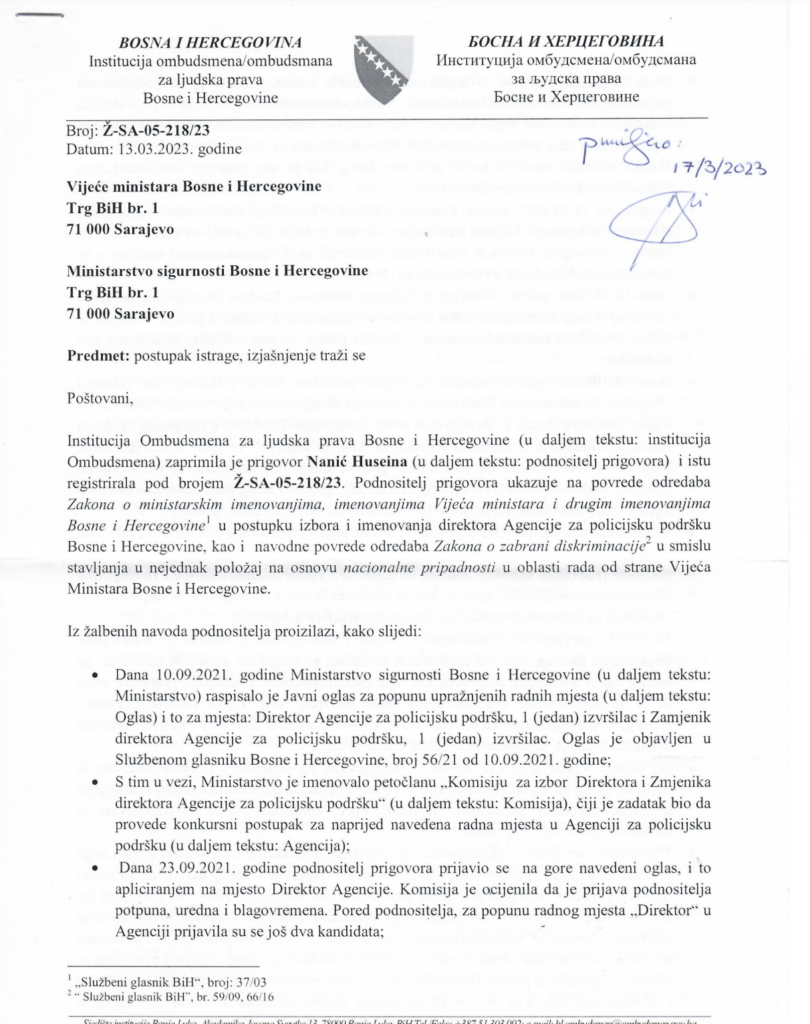
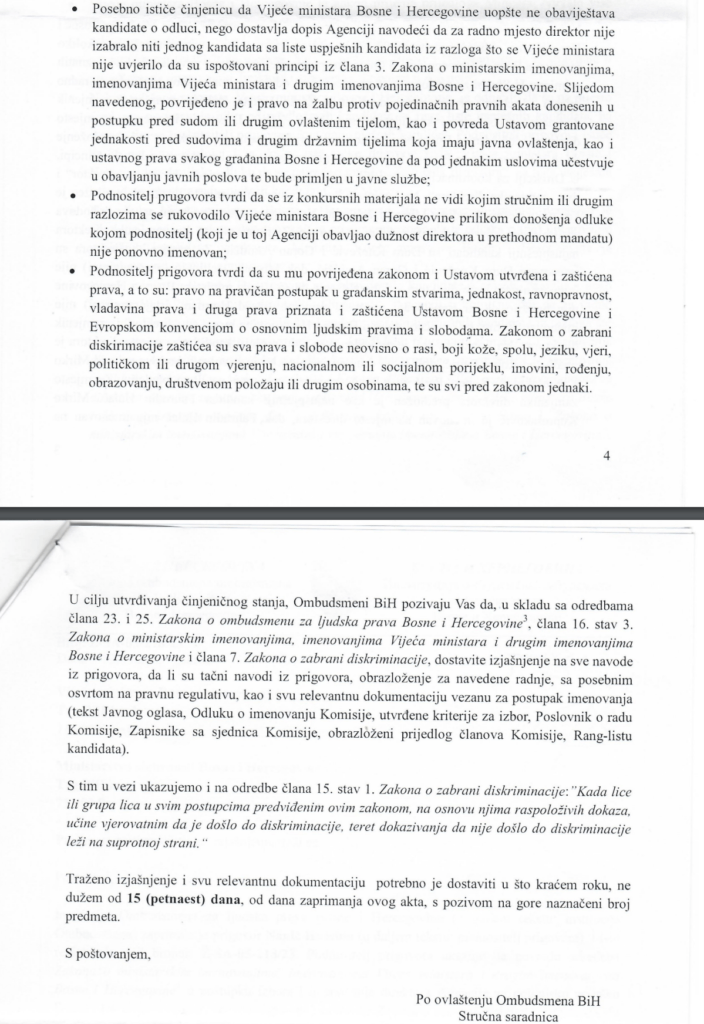
In February of this year, the Council of Ministers of Bosnia and Herzegovina appointed the management personnel for the Service for Foreigners’ Affairs (director and one deputy), the Directorate for the Coordination of Police Bodies (director and two deputies), the Border Police of Bosnia and Herzegovina (director and deputy), and the Police Support Agency (director and one deputy) in their new mandate.
The lowest common denominator
They were evaluated as the best candidates in the application procedure conducted based on the vacancies announced during the previous term of the Council of Ministers and published in the Official Gazette of Bosnia and Herzegovina.
No, at that time, the best-rated candidates from the Serbian and Croatian communities were appointed, but not the Bosniak candidate who ranked first in the same competition and was evaluated by the same commission. These decisions were made despite the Director of the Legislative Office warning the Council of Ministers of Bosnia and Herzegovina during the session that such actions were unlawful.
– The common factor in all these cases is incomplete, discretionary, discriminatory, and unlawful appointments. In mathematical terms, all the mentioned selections have the lowest common denominator, which is the absolute non-appointment of candidates from the Bosniak community – stated the letter sent by the Ombudsman’s Office in Bosnia and Herzegovina to the Council of Ministers of Bosnia and Herzegovina in March, based on a complaint filed by one of the candidates who considered themselves harmed.
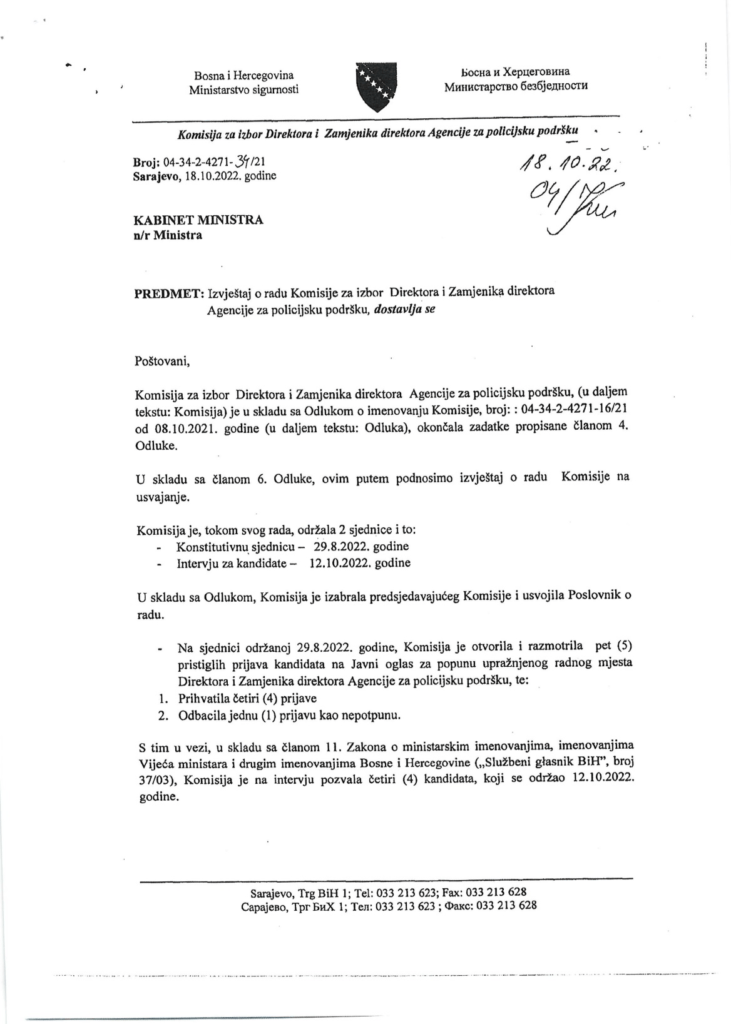
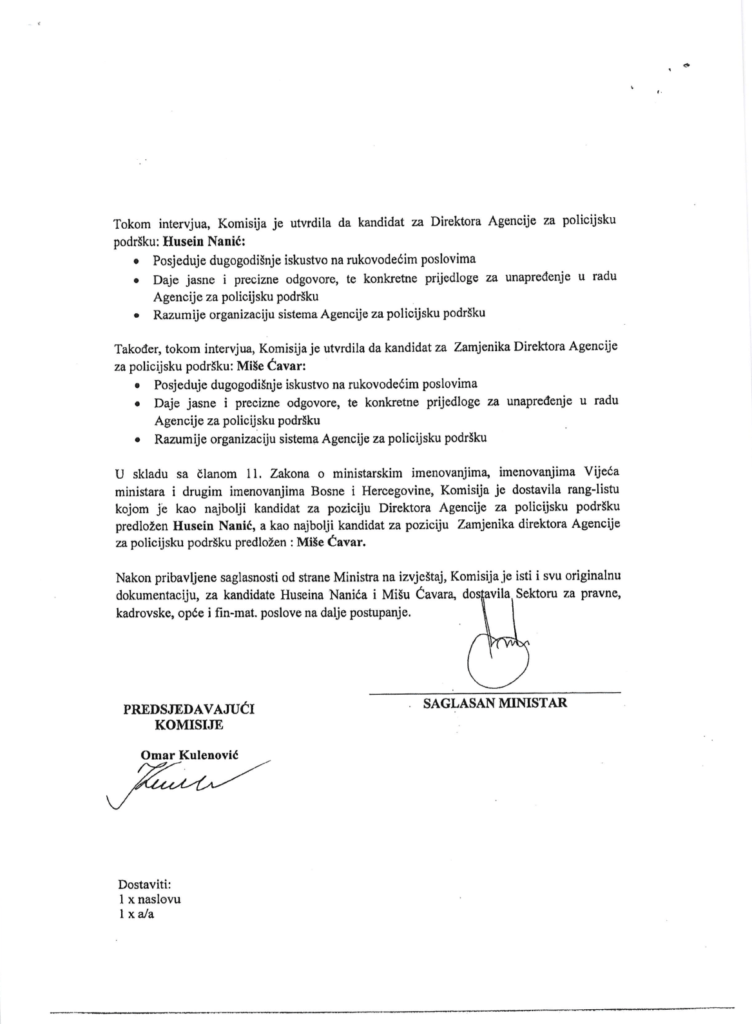
The Ombudsmen also assessed that the Council of Ministers of Bosnia and Herzegovina unlawfully divided the comprehensive and unified process of selecting directors and deputy directors of the Council of Ministers, annulling some appointments while confirming others.
– Only if there are legally prescribed reasons related to successful candidates, supported by evidence confirming their qualifications, can the Council of Ministers proceed with appointments – wrote the Ombudsmen to the Council of Ministers of Bosnia and Herzegovina and the Ministry of Security in the Council of Ministers.
New government, new personnel
Four months later, on June 7, 2023, based on a new competition announced only for vacant positions, the management personnel for two agencies were appointed. The remaining two positions were still in the process of selecting candidates at the time of writing this text.
– Bosnia and Herzegovina remains captured – says Ivana Korajlić, the Executive Director of Transparency International in Bosnia and Herzegovina, who has already addressed the Council of Ministers and the Ombudsmen regarding the appointments.
She emphasizes that one competition was announced for all positions. That’s why…
– It is impossible for the competition to be acceptable for two positions and not for one. It is very clear that the new government wants to place its own personnel because these institutions are of the highest interest, and everyone wants control in the security sector. If something is controversial, it is controversial for everyone. This is solely about appointing their own personnel – says Korajlić.
She also questions who will ultimately be held responsible for violating the law.
Selective application of the law
Stefan Blagić from Restart RS, who also deals with appointments, believes that it is necessary to come to terms with the fact that the Party of Democratic Action (SDA) has cleverly left its personnel through whom it can continue to exert influence.
– It is more than clear that this is a captured state, and it is difficult to eliminate the remnants of the SDA. The Law on Appointments is more than clear, and I believe that the law will prevail, and these decisions will be overturned. On the other hand, we have another 3.5 years of this mandate ahead of us, and we will see what the new government will do. The law can be changed if they want to, but it cannot be applied retroactively in these cases because laws do not have retroactive effect – says Blagić.
He also emphasizes that laws in Bosnia and Herzegovina are often selectively applied, but at the state level, it is more difficult because those laws are more regulated than others.
The Ombudsmen have also pointed out that the candidates who were not appointed did not receive any notification, which prevented them from filing complaints, which is a basic right of every individual.
– I am confident that this case can end up in favour of the candidates who were not appointed in court; it is just a question of how persistent these candidates will be and how long the legal process will take – says Blagić.
Helez: I knew it!
Zukan Helez, the Minister of Defense in the Council of Ministers of Bosnia and Herzegovina, says he knew that the decision made in February would be misused.
– I proposed that everyone be appointed as acting officials, and then we could announce a new competition and make appointments for all positions. However, there was no understanding – says Helez.
However, he believes that there was no discrimination in these cases.
– Discrimination would be if Serbs or Croats were appointed to these positions instead of Bosniaks, but that did not happen. The final decision on these appointments is made by the Council of Ministers of Bosnia and Herzegovina, and Bosniaks will be appointed to those positions, but not those who suit someone’s interests and have been in those or other positions for 20 years without accomplishing anything, and now they want another four years. Ask them to tell you five sentences about what they do and what they have accomplished. Currently, there are acting officials, and new people will be appointed – says Helez.
Nenad Nešić, the Minister of Security, whose responsibilities cover all the bodies where controversial appointments were partially made, says he does not know how some proposals evaluated in the same process were considered acceptable while others were not.
Even before the June decision of the Council of Ministers of Bosnia and Herzegovina, he announced the appointment of the Director of the Agency for Coordination of Police Bodies and the Deputy Director of the Border Police.
However, according to media reports, the proposal for this appointment came from the Minister for Human Rights and Refugees, Sevlid Hurtić.
To the detriment of the state
Just to remind you, in February, the Council of Ministers of Bosnia and Herzegovina appointed Žarko Leka as the Director of the Service for Foreigners’ Affairs, but not Mirsad Buzar as the Deputy Director.
In the Directorate for Coordination of Police Bodies, two deputy directors, Đuro Knežević and Goran Amidžić, were appointed, but Mirsad Dželilović was not appointed as the director.
In the Border Police of Bosnia and Herzegovina Mirko Kuprešaković was appointed as the director, even though he was the second-ranked candidate, as the first-ranked candidate, Robert Petrić, had been appointed to another position, but Fahrudin Halač was not appointed as the deputy director. And in the Police Support Agency, Husein Nanić was not appointed as the director, but Mišo Ćavar was appointed as the deputy director.
All the candidates who were not appointed were informed that the Council of Ministers was not convinced that the legally prescribed procedure had been followed.
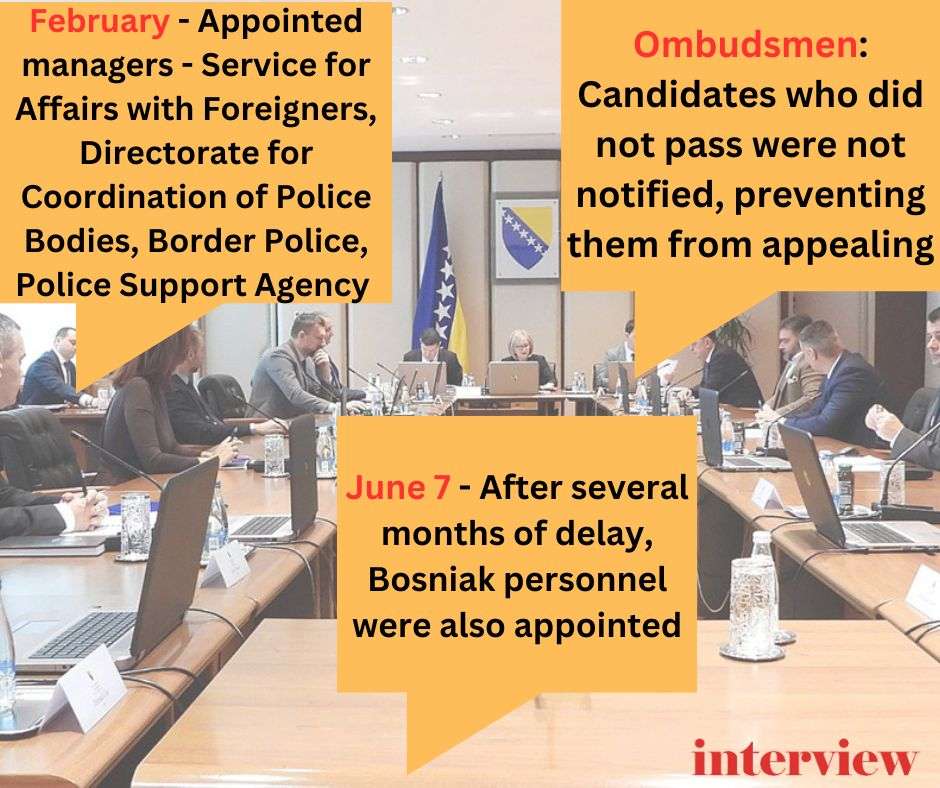
Later, in June, Enes Karić was appointed as the director of the Directorate for Coordination of Police Bodies in Bosnia and Herzegovina, and Ensad Korman was appointed as the deputy director of the Border Police of Bosnia and Herzegovina.
Last week, after several months of delay, the Council of Ministers finally appointed Bosniak candidates.
However, as Ćibo predicts, some cases will end up in court. In favor of the plaintiffs, and to the detriment of the state of Bosnia and Herzegovina.








